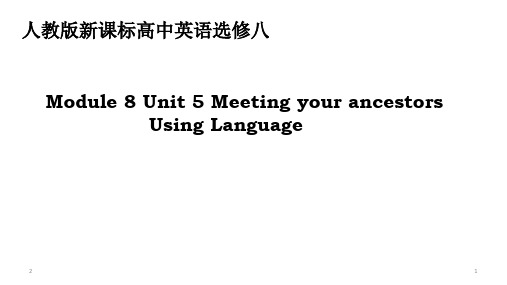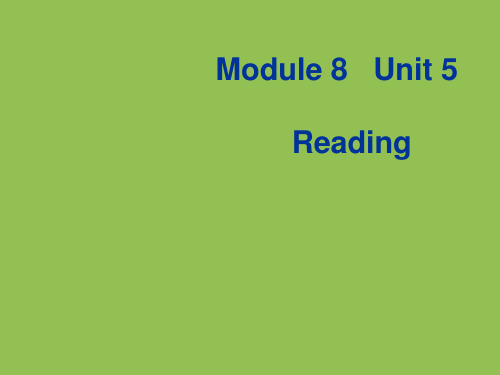选修八Unit5Reading
合集下载
人教课标版高中英语选修8Unit5 Reading(共15张PPT)

4
What lifestyle did the Peking Man live?
tough
primitive
2020/ information
1. What is the writing style of the passage? A. Exposition(说明型) B. Argumentation(议论型) C. Description(描写型) D. Narration (叙事型)
Q: What do you think of Dahu's task? What kind of person he is ? sharpen scrapers
first looked carefully then pulled out , struck now and then stopped , tried and continued
Q: What do you think of men's task in primitive society ?
dangerous, protective “She had almost reached her destination when a delicious smell arrested her progress.”
人教版新课标高中英语选修八
Module 8 Unit 5 Meeting your ancestors Using Language
2
1
What would people do to celebrate a special day in
modern times?
Have a feast
2020/6/20
wwoorrrierdied
accelerated her
What lifestyle did the Peking Man live?
tough
primitive
2020/ information
1. What is the writing style of the passage? A. Exposition(说明型) B. Argumentation(议论型) C. Description(描写型) D. Narration (叙事型)
Q: What do you think of Dahu's task? What kind of person he is ? sharpen scrapers
first looked carefully then pulled out , struck now and then stopped , tried and continued
Q: What do you think of men's task in primitive society ?
dangerous, protective “She had almost reached her destination when a delicious smell arrested her progress.”
人教版新课标高中英语选修八
Module 8 Unit 5 Meeting your ancestors Using Language
2
1
What would people do to celebrate a special day in
modern times?
Have a feast
2020/6/20
wwoorrrierdied
accelerated her
人教课标版高中英语选修8Unit5reading上课ppt课件

When she was near home, a delicious smell 4. arrested
(arrest) her progress and her senses became dizzy 5. with
hunger. She saw her mother and the older children preparing the
C her life.
A. tired of
B. worried about
C. satisfied with D. disappointed with
V. 语法填空(根据课文内容The Feast:18,000 BC on P43,依据语
法规则完成短文)
Not having looked 1.ahead and planned better, Lala felt very
between early people 10. or
they
traveled to the seaside on their journey.
IV. Reading comprehension (根据课文The Feast:18,000 BC on P43选择正确答案) 1.What is the main idea of the passage? D A.The marriage life of Lala and Dahu. B. The separate responsibility of men and women. C. The difference between early life and modern life. D. The preparations for a feast.
8. lake .
人教课标版高中英语选修8Unit5reading(共38张PPT)

人教版英语选修八
Unit 5 Meeting our ancestors Using language
What a delicious feast!
Pre-reading
1. Can you guess what would be eaten on the feast in 18,000 BC?
Dahu:
patient (tool making), dangerous (hunting), some individual (tool making and repairing) and some cooperative (hunting), skilful (tool making), protective (of group)
the construction of a harmonious home.
Homework
•.
Mother’s Day is in May,
•
Father’s Day is coming.
•
What will you do for
your mother and your
father? greet your parents.
2. Choose the best answer.
1. From the first paragraph, we can learn that the family groups lived on _____.
A. fish B. crops C. hunting D. farming
2. Lala’s guests came to ____. A. dance B. talk about an important thing C. enjoy a feast D. see Lala
Unit 5 Meeting our ancestors Using language
What a delicious feast!
Pre-reading
1. Can you guess what would be eaten on the feast in 18,000 BC?
Dahu:
patient (tool making), dangerous (hunting), some individual (tool making and repairing) and some cooperative (hunting), skilful (tool making), protective (of group)
the construction of a harmonious home.
Homework
•.
Mother’s Day is in May,
•
Father’s Day is coming.
•
What will you do for
your mother and your
father? greet your parents.
2. Choose the best answer.
1. From the first paragraph, we can learn that the family groups lived on _____.
A. fish B. crops C. hunting D. farming
2. Lala’s guests came to ____. A. dance B. talk about an important thing C. enjoy a feast D. see Lala
选修8 Unit 5 Reading

Peking Man
A Visit to the Zhoukoudian Caves
Skimming
Look at the three pictures and find out the 3 topics that the archaeologist talked about.
Topic 1
D. Higher up the hill.
2. Which of the following is the correct order about how early people made clothes? a. clean the fat and meat from the skin b. cut up the animals
in Zhoukoudian ____
A.were able to do the same thing as tigers or bears.
B.were much cleverer than tigers or bears.
C.were trained how to use needles.
D.could make clothes like we have today.
手工艺
Its name What it was made of gold gol
Its use
to cover the face of the Pharaoh after his death
Today’s alternative none
death death mask mask
Group work
Possible answers:
1. How did they keep warm?
They constructed the fires in the centre of the caves to
选修8 Unit 5 Reading

the pharaoh’s face after he died. Sometimes they
were also buried with the dead pharaoh. They were
made of gold and decorated in beautiful colours. It
shows that the pharaoh expected his objects to
Topic1:Life in the cave (beginning-line23)
1. Where did Peking men live?
2. How did they keep warm?
3. What wide animals were there?
1. Where did Peking Man live? They lived in caves higher up the hill. 2. How did they keep warm during the freezing what else did they winter? use fire for? They used fireplaces in the center of the cave. They might have hung animal skins at the cave mouth. 3. What wide animals were there? There were tigers and bears. These were their most dangerous enemies.
District,Beijing.It is famous for Peking
Man, a complete skull (头盖骨)of an
- 1、下载文档前请自行甄别文档内容的完整性,平台不提供额外的编辑、内容补充、找答案等附加服务。
- 2、"仅部分预览"的文档,不可在线预览部分如存在完整性等问题,可反馈申请退款(可完整预览的文档不适用该条件!)。
- 3、如文档侵犯您的权益,请联系客服反馈,我们会尽快为您处理(人工客服工作时间:9:00-18:30)。
语法填空
根据课文A Visit to the Zhoukoudian Caves完成下列短文。 A group of students from England have come to the Zhoukoudian Cave for a visit. archaeologist is showing them around. The An archaeologists have been excavating (excavate) here for many years. After finding human and animal bones in those caves higher up the hill as well as tools and ornaments,they think it reasonable to assume they lived in these caves,regardless of the cold. They discovered fireplaces in the center of the caves where they constructed fires. Some evidence suggests that our ancestors did indeed wear clothes made (make) from animal skins. The archaeologist also shows the students a primitive necklace preserved (preserve) quite well. Indeed, as the botanical analysis has been specially (special) showing us,all the fields around here used to be part of a large shallow lake. Perhaps there was trade between early peoples or they traveled to the seaside on their journeys.
Words review
alternative
starvation tentative accuracy interrupt acute assume
n. 可能的选择 adj. 供选择的; 其他的 n. 挨饿;饿死 adj. 试探性的;不确定的n. 精确;准确 vt. & vi. 打断……讲话;打 岔;暂时中断或中止 adj. 有观察力的;敏锐的; 严重的;深刻的 vt. 假定;设想
细节题 1. Where do the caves lie?
A. In the forest.
B. On the seaside.
C. At the foot of the hill.
D. Higher up the hill.
2. What is the right order of early people making clothes? a. removing the skin b. rubbing salt onto the skin c. removing the fat and meat from the skin d. cutting up animals e. cutting the skin and sewing the pieces together A. a-c-d-b-e B. d-a-c-b-e C. a-c-b-e-d D. d-c-b-a-e
现在完成进行时
• 1.构成形式:
has\have been doing
用法
1, 叙述某一动作从过去开始一直继续到现 在仍在继续之中或刚刚停止。经常与for, since, recently, all morning/day/week,how long, all the time用在一起。 • 1) You have been studying for four straight hours. Why don’t you take a break? • 2) The telephone has been ringing for almost a minute. Why doesn’t someone answer it?
推理判断题
5. What can we infer from the sentences--“This one looks very like a fish bone. Is it reasonable? ---Yes indeed, as the botanical analyses have shown us, all the fields around here used to be part of a large shallow lake. Probably there were fish in it.”? A. Being an archaeologist needs a wide range of knowledge. B. A lake is not the sea. C. People can identify the fish by the colour. D. A fish bone can be made into a necklace.
2, 叙述从过去某时开始一直继续到现在,但不 再继续下去的事情。--带有浓厚的感情色彩, 强调持续了“那么久”或做得“那么辛苦”
• 1) Oh, you have come at last! I have been waiting for you for two long hours.(我等了 你足足两个小时) • 2) You are here! I have been looking for you long.(我找了你老半天)
4. Which of the following shows us the earliest people and the modern people have something in common? A. People hung animal skins to keep out the cold B. People never grew their own crops C. People use science D. People care about their appearance 5. What can we infer from the sentences--- “This one looks very like a fish bone. Is it reasonable? ---Yes indeed, as the botanical analyses have shown us, all the fields around here used to be part of a large shallow lake. Probably there were fish in it.”? A. Being an archaeologist needs a wide range of knowledge. B. A lake is not the sea. C. People can identify the fish by the colour. D. A fish bone can be made into a necklace.
Who are they?
Read the text carefully and choose the best answer.
1. Where do the caves lie? A. In the forest. B. On the seaside.
C. At the foot of the hill. D. Higher up the hill. 2. What is the right order of early people making clothes? a. removing the skin b. rubbing salt onto the skin c. removing the fat and meat from the skin d. cutting up animals e. cutting the skin and sewing the pieces together A. a-c-d-b-e B. d-a-c-b-e C. a-c-b-e-d D. d-c-b-a-e 3. The following things were used by early people to make clothes EXCEPT _____. A. sharpeners B. needles C. salt D. knives
3, 叙述“最近”一直从事的工作或活动。 --lately, recently • What’s the matter? Your eyes are red and puffy. Have you been crying?(你 是不是一直在哭?)
4, 叙述从过去某时到现在,或最近,一再重 复的动作。 • I have been knocking. I don’t think anybody’s in.(我一直在敲门。我想没人在 里面。) • I have been writing letters since breakfast.(我从早餐起就一直在写信)
2. — There is so much snow these days,
isn't there?
— Yes, it ____ for a few days.
A. was snowing
பைடு நூலகம்B. has been snowing
C. had been snowing
D. snowed
3. Although these scientists ____ on the project for nearly four years, I don't know how long it will last. A. have been working B. had worked C. were working
